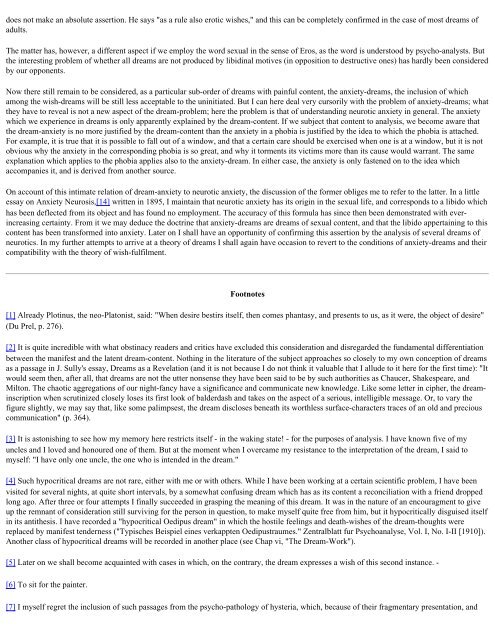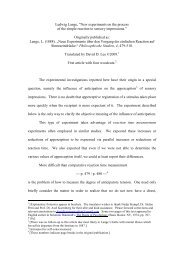The Interpretation Of Dreams Sigmund Freud (1900) PREFACE
The Interpretation Of Dreams Sigmund Freud (1900) PREFACE
The Interpretation Of Dreams Sigmund Freud (1900) PREFACE
You also want an ePaper? Increase the reach of your titles
YUMPU automatically turns print PDFs into web optimized ePapers that Google loves.
does not make an absolute assertion. He says "as a rule also erotic wishes," and this can be completely confirmed in the case of most dreams of<br />
adults.<br />
<strong>The</strong> matter has, however, a different aspect if we employ the word sexual in the sense of Eros, as the word is understood by psycho-analysts. But<br />
the interesting problem of whether all dreams are not produced by libidinal motives (in opposition to destructive ones) has hardly been considered<br />
by our opponents.<br />
Now there still remain to be considered, as a particular sub-order of dreams with painful content, the anxiety-dreams, the inclusion of which<br />
among the wish-dreams will be still less acceptable to the uninitiated. But I can here deal very cursorily with the problem of anxiety-dreams; what<br />
they have to reveal is not a new aspect of the dream-problem; here the problem is that of understanding neurotic anxiety in general. <strong>The</strong> anxiety<br />
which we experience in dreams is only apparently explained by the dream-content. If we subject that content to analysis, we become aware that<br />
the dream-anxiety is no more justified by the dream-content than the anxiety in a phobia is justified by the idea to which the phobia is attached.<br />
For example, it is true that it is possible to fall out of a window, and that a certain care should be exercised when one is at a window, but it is not<br />
obvious why the anxiety in the corresponding phobia is so great, and why it torments its victims more than its cause would warrant. <strong>The</strong> same<br />
explanation which applies to the phobia applies also to the anxiety-dream. In either case, the anxiety is only fastened on to the idea which<br />
accompanies it, and is derived from another source.<br />
On account of this intimate relation of dream-anxiety to neurotic anxiety, the discussion of the former obliges me to refer to the latter. In a little<br />
essay on Anxiety Neurosis,[14] written in 1895, I maintain that neurotic anxiety has its origin in the sexual life, and corresponds to a libido which<br />
has been deflected from its object and has found no employment. <strong>The</strong> accuracy of this formula has since then been demonstrated with everincreasing<br />
certainty. From it we may deduce the doctrine that anxiety-dreams are dreams of sexual content, and that the libido appertaining to this<br />
content has been transformed into anxiety. Later on I shall have an opportunity of confirming this assertion by the analysis of several dreams of<br />
neurotics. In my further attempts to arrive at a theory of dreams I shall again have occasion to revert to the conditions of anxiety-dreams and their<br />
compatibility with the theory of wish-fulfilment.<br />
Footnotes<br />
[1] Already Plotinus, the neo-Platonist, said: "When desire bestirs itself, then comes phantasy, and presents to us, as it were, the object of desire"<br />
(Du Prel, p. 276).<br />
[2] It is quite incredible with what obstinacy readers and critics have excluded this consideration and disregarded the fundamental differentiation<br />
between the manifest and the latent dream-content. Nothing in the literature of the subject approaches so closely to my own conception of dreams<br />
as a passage in J. Sully's essay, <strong>Dreams</strong> as a Revelation (and it is not because I do not think it valuable that I allude to it here for the first time): "It<br />
would seem then, after all, that dreams are not the utter nonsense they have been said to be by such authorities as Chaucer, Shakespeare, and<br />
Milton. <strong>The</strong> chaotic aggregations of our night-fancy have a significance and communicate new knowledge. Like some letter in cipher, the dreaminscription<br />
when scrutinized closely loses its first look of balderdash and takes on the aspect of a serious, intelligible message. Or, to vary the<br />
figure slightly, we may say that, like some palimpsest, the dream discloses beneath its worthless surface-characters traces of an old and precious<br />
communication" (p. 364).<br />
[3] It is astonishing to see how my memory here restricts itself - in the waking state! - for the purposes of analysis. I have known five of my<br />
uncles and I loved and honoured one of them. But at the moment when I overcame my resistance to the interpretation of the dream, I said to<br />
myself: "I have only one uncle, the one who is intended in the dream."<br />
[4] Such hypocritical dreams are not rare, either with me or with others. While I have been working at a certain scientific problem, I have been<br />
visited for several nights, at quite short intervals, by a somewhat confusing dream which has as its content a reconciliation with a friend dropped<br />
long ago. After three or four attempts I finally succeeded in grasping the meaning of this dream. It was in the nature of an encouragment to give<br />
up the remnant of consideration still surviving for the person in question, to make myself quite free from him, but it hypocritically disguised itself<br />
in its antithesis. I have recorded a "hypocritical Oedipus dream" in which the hostile feelings and death-wishes of the dream-thoughts were<br />
replaced by manifest tenderness ("Typisches Beispiel eines verkappten Oedipustraumes." Zentralblatt fur Psychoanalyse, Vol. I, No. I-II [1910]).<br />
Another class of hypocritical dreams will be recorded in another place (see Chap vi, "<strong>The</strong> Dream-Work").<br />
[5] Later on we shall become acquainted with cases in which, on the contrary, the dream expresses a wish of this second instance. -<br />
[6] To sit for the painter.<br />
[7] I myself regret the inclusion of such passages from the psycho-pathology of hysteria, which, because of their fragmentary presentation, and



